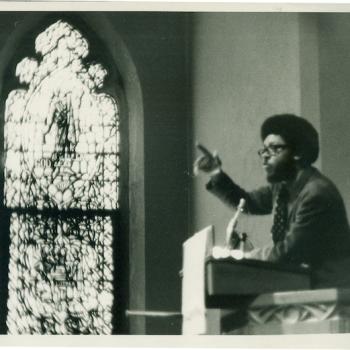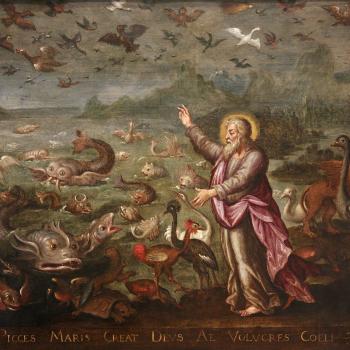By Rebecca Lynne Fullan
In my saner moments, when the perception of grace overtakes me like a sudden wave, I am sometimes suddenly grateful and delighted that food tastes good. I mean, hey, if it tasted disgusting, we would still have to eat it, right? But instead there's a richness of pleasurable sensation in an act that simply keeps us alive.
My loved ones who are students of evolution tell me that food tastes good to us because human beings were (and are) more likely to eat food that does taste good -- therefore, our ancestors who enjoyed food that is beneficial to our bodies tended to do better overall, producing more offspring and passing their genetically influenced tastes on to the next generation and the next.
When I described my excitement and feelings of grace surrounding the tastiness of food, my biologist friend told me that I would make a good student of evolution.
My most exuberantly Christian student -- a senior in high school, and filled with almost-adult capacity for thought and this bursting-through little boy energy that charms me deeply -- burst into my tutoring session with another student and began to tell us both about his discovery of intelligent design theory. With great delight, he told us how the orange was created for people to eat -- it's easy to peel, nice and sweet, and comes in handy sections, thus providing a convenient lesson on how we should all share with one another.
"Well, all right," I said, "but what about the coconut?" This did not dampen his enthusiasm -- the coconut, he ventured, was for monkeys to grab onto and use as flotation devices in case of a shipwreck.
"God even thought of the monkeys," he insisted.
Leaving aside why all these monkeys and coconuts would be on a ship together, as well as the anthropocentrism of his statement, the wonder he and my biologist friend and I feel in considering our food and our bodies has a unity that, to me, pulls across our varying understandings of how these bodily experiences came to be, or what meaning they have.
While I do subscribe (currently in a mostly blind-faith kinda way, apologies to the shade of Darwin) to the theory of evolution, the debate on these matters is not my point. My point is that being incarnate is an experience soaked in daily miracles, and the frameworks we use to understand these miracles, from a spiritual perspective, matter much less than to stop, and chew, and swallow, and smile, and feel the mystery and the gratitude in every inch and cell of our bodies, our selves.
Here's where Catholicism gives me a big, intense, make-you-gasp-for-air kinda kiss of a gift. When I go to Mass, I eat God. A completely in the flesh God. In my mouth. Down my throat. Into my blood, running all over my body.
It really is just as weird as the non-Catholics say. Weirder, maybe. But I find, in my on-going Jacobesque wrestling match with my ambiguous angel of a religious tradition (I will not let you go until you bless me!), that when I take Jesus in my mouth, chew and swallow him on down, and rest on my knees in the pew afterward, the tension of the wrestling tends to dissipate into a watching. I watch the bodies of the people going up to Communion around me. I watch their faces and their shoulders and the backs of their knees. I believe the stranger who handed me the cup and called me sister. I feel our bodies as connected, and I feel our connectedness as divine.
My faith pushes me, if I'm going to pay this crazy transubstantiation thing any attention, to step right into the mystery of being embodied. It tells me that what happens in the flesh and what happens in the spirit are not disconnected -- God in a body is, after all, the foundation of that faith, and we in the church are now called that body, together, we make God-body, and we carry it around, up and down the stairs, in and out of bed, with groans and aches and shivers and sweats and all that, all that shit, if you'll excuse my saying so explicitly.




